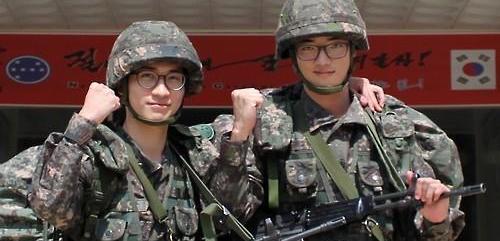- California Assembly OKs highest minimum wage in nation
- S. Korea unveils first graphic cigarette warnings
- US joins with South Korea, Japan in bid to deter North Korea
- LPGA golfer Chun In-gee finally back in action
- S. Korea won’t be top seed in final World Cup qualification round
- US men’s soccer misses 2nd straight Olympics
- US back on track in qualifying with 4-0 win over Guatemala
- High-intensity workout injuries spawn cottage industry
- CDC expands range of Zika mosquitoes into parts of Northeast
- Who knew? ‘The Walking Dead’ is helping families connect
Inter-Korean tensions alter sense of national security in young generation

This undated photo, released on Aug. 24, 2015, by the Army headquarters, shows two South Korean soldiers, Sgt. Chun Moon-kyun (L) and Sgt. Joo Chan-joon, posing for a photo. (Yonhap)
SEOUL (Yonhap) — Cho Min-soo, a 22-year-old sergeant assigned to the 3rd Division in the central front of the South Korean Army, was supposed to be discharged Tuesday and start work as a civilian in September.
Cho, however, requested his discharge be delayed when the high-level talks between South and North Korea stretched into their third day with no clear signs of progress in defusing heightened tensions.
The tensions between the two Koreas had risen dramatically in recent weeks after South Korea accused North Korea of being behind a landmine attack that maimed two South Korean soldiers on Aug. 4.
The North also fired artillery shells across the border last Thursday, prompting South Korea to fire back dozens of shells.
South Korea resumed the propaganda broadcasts along the heavily fortified border earlier this month for the first time in 11 years in retaliation against North Korea for the landmine attack.
“It’s obvious for soldiers to take part in defending the country when it’s at its crisis,” Cho said.
Cho was not the only one to postpone the discharge from the Army.
Moon Jeong-hoon, a sergeant working for the 5th Division in the western front where the North launched artillery shelling requested his discharge be delayed, which had been scheduled for Tuesday.
“I was disgusted to see the North not admitting their provocations,” said Moon.
A petty officer second class Chang Woo-min, who serves his duty at the South Korean border island of Baengyeong in the Yellow Sea, also had his discharge date delayed on Monday, Marine officials said.
Until Tuesday, where the two Koreas produced an agreement on defusing heightened tensions after four days of intensive high-level talks, this sort of voluntary suspension of discharge continued throughout the country.

A group of conscripts salutes during a ceremony at a boot camp in the city of Nonsan, 213 kilometers south of Seoul, on Aug. 24, 2015 to mark the camp’s reception of recruits at a time when tensions between the Koreas have risen dramatically following the North’s launch of a landmine attack and firing of artillery shells across the border. All able-bodied South Korean males are required to serve almost two years in the military. (Yonhap)
According to the Army, over 80 soldiers have volunteered to have their discharges postponed during the heightened tensions on the Korean Peninsula.
“After witnessing the series of provocations from the North and their peers being injured from the attacks, hostility toward the North seems to have settled among some of the younger generation,” Koo Jeong-woo, a professor at Sungkyunkwan University, said.
For decades, North Korea has had a track record of carrying out provocations against South Korea, including the sinking of a South Korean warship and the shelling of a South Korean border island, both in 2010 that killed 50 South Koreans.
A local film depicting a bloody inter-Korean naval clash in 2002, “Northern Limit Line,” which attracted over 6 million viewers, also aroused patriotic sentiment in the country.
The film depicts the naval skirmish off the South Korean border island Yeonpyeong on June 29, 2002, which left six South Korean sailors dead and 18 others injured.
Amid the rising popularity of the film, Prime Minister Hwang Kyo-ahn visited the border island of Yeonpyeong in July, and said “the movie acted as an opportunity to bring out patriotism.”
Hwang pointed out most movie goers are those in their 20s and 30s.
In the online world, similar patriotic movements followed.
When the North’s attack was first reported earlier this month, numbers of military reservists posted photos of their military uniforms and boots on social network services (SNS) such as Facebook and Instagram with comments that they would willingly fight for the country in case of a declaration of war.
“There is a huge difference from the time where we all sang together in the classrooms that our only wish is reunification,” professor Koo said.
“The way young people see the North has changed from an emotional approach to a very realistic and practical one,” Koo added. “Instead of singing that our wish is to be reunified, many young folks now analyze what gains and losses would come when the divided peninsula is reunified.”
On the other hand, some say the words and actions of minorities shouldn’t be an indicator to judge the change in the sense of national security.
Seol Dong-hoon, professor at Chonbuk National University, points out that it’s a far-fetched interpretation to say there is a change in the awareness of national security just by looking at the decisions made by a limited number of people, such as those 50 soldiers who decided to have their discharges delayed or those who post uniform photos on SNS.
“What’s shown on SNS is far from being an average public opinion,” Seol said, explaining the nature of the media platforms where extreme and provocative comments tend to survive and remain exposed to the public.















